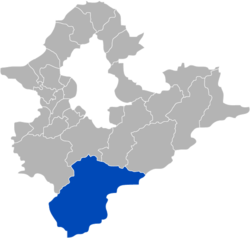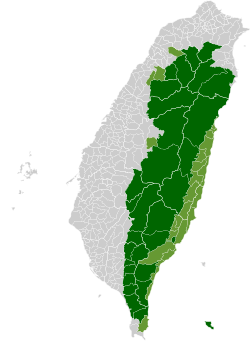Wulai District
Wulai
烏來區 Ulay | |
|---|---|
| Wulai District | |
 | |
 Wulai District in New Taipei City | |
| Country | Republic of China (Taiwan) |
| Municipality | New Taipei City |
| Urban villages | 5 |
| Government | |
| • Type | District government |
| • District chief | Kao Fu-kuang (Ind.) |
| Area | |
• Total | 321.1306 km2 (123.9892 sq mi) |
| Population (March 2023) | |
• Total | 6,300 |
| • Density | 20/km2 (51/sq mi) |
| Time zone | UTC+8 (National Standard Time) |
| Postal code | 233 |
| Website | www |
Wulai District (Atayal: Ulay; Chinese: 烏來區; pinyin: Wūlái Qū; Pe̍h-ōe-jī: U-lai-khu)[2] is a mountain indigenous district in southern New Taipei City in northern Taiwan. It sits near the border with Taipei and is famous for its hot springs.[3] It is the largest district in New Taipei, as well as the most mountainous, and is home to the indigenous Atayal people.
Name
The name of the town derives from the Atayal phrase kilux ulay meaning "hot and poisonous" when an Atayal hunter hunting by a stream saw mist coming from it.[4]
History
Formerly classified as an "Aboriginal area" under Taihoku Prefecture during Japanese rule, Wulai was organized as a rural township of Taipei County after the handover of Taiwan from Japan to the Republic of China in 1945.
On June 22, 2001, President Chen Shui-bian visited a local school and hosted a graduation ceremony there.[5]
On December 25, 2010, Taipei County was upgraded to the special municipality of New Taipei City and Wulai was upgraded to a district.
In August 2015, Wulai was devastated by Typhoon Soudelor, wiping out several hotels and destroying hot springs in the region. The course of the Nanshi River that passes through the district has since changed, with the riverbank eroded heavily by surging water.[3] Heavy landslides were attributed to the overdevelopment of the mountain areas around the river which damaged the soil and watershed along the slope lands.[6]
Geography


- Elevation: 250 meters (820 ft) (average)
- Area: 321.13 square kilometers (123.99 sq mi)
- Population: 6,300 people (March 2023)
Administrative divisions
Wulai District is divided into five urban villages:[7][8][9]
- Zhongzhi[10]/Jhongjhih[8][11] (忠治里), Wulai[8][9][10] (烏來里), Xiaoyi[12]/Siaoyi[8][9] (孝義里), Xinxian[13]/Sinsian[8][9][14] (信賢里) and Fushan[8][9] (福山里) Village.
Tourist attractions
Wulai is a tourist town most renowned for its hot springs, sightseeing, and aboriginal culture. Other activities include hiking, camping, swimming, fishing, and birdwatching. During the spring, visitors come see the cherry trees bloom. According to locals, bathing in the odorless hot springs can cure skin diseases (such as ringworm, eczema, and herpes).
- Fushan Botanical Garden
- Neidong National Forest Recreation Area
- Wulai Atayal Museum
- Wulai Forestry Life Museum
- Wulai Old Street
- Yun Hsien Resort
- Wulai Hot Spring – visitors often go to the numerous hot spring hotels, public baths, as well as the Nanshi River.
- Waterfalls – Several waterfalls exist in the Wulai gorge, but the largest is Wulai Waterfall.
- Wulai Gondola – the gondola takes visitors to the top of Wulai Waterfall, where it accesses the Yun Hsien Resort.
- Atayal aboriginal culture – many shops in Wulai specialize in aboriginal foods, arts, crafts, and clothing.
Transportation

Road
Wulai District is accessible by Xindian Bus from Xindian Station of Taipei Metro to Wulai Bus Terminus.[15]
The 9A branch line of the Provincial Highway 9 passes through the district.[16]
Rail
The district also has the Wulai Scenic Train, a converted mine train built during the Japanese era that takes visitors from downtown Wulai to the attractions at the base of Wulai Waterfall.
Notable people
- Tony Coolidge (1970-), Atayal-American filmmaker
Gallery
-
Children playing in the Wulai River
-
Wulai Falls as seen from above from the Gondola
-
Wulai Gorge as seen from the Gondola
-
Aboriginal Shops on the main street
-
A view of the buildings around the Tonghou River.
-
Wulai Suspension Bridge over Nanshi River with incoming storm
See also
References
- ^ 第一篇_歷史沿革 (PDF). Wulai District Office, New Taipei City Government 烏來區公所 (in Chinese (Taiwan)). p. 26.
- ^ "Entry #35055 (烏來)". 臺灣閩南語常用詞辭典 [Dictionary of Frequently-Used Taiwan Minnan]. (in Chinese and Hokkien). Ministry of Education, R.O.C. 2011.
- ^ a b Shan, Shelley (11 Aug 2015). "Rescuers search for missing in Wulai". Taipei Times. p. 1.
- ^ "Visit Wulai for Atayal culture, hot springs during holiday - The China Post". Archived from the original on 2015-06-04.
- ^ 烏來鄉志烏來大事記 (PDF). Wulai District Office, New Taipei City Government 烏來區公所 (in Chinese (Taiwan)). p. 302. Retrieved 8 October 2019.
06月22日,陳水扁總統蒞臨烏來國民中小學,主持學生畢業典禮。
- ^ "Wulai cut off in wake of Soudelor - The China Post". Archived from the original on 2015-08-14.
- ^ 鄰里介紹. Wulai District Office, New Taipei City Government 烏來區公所 (in Chinese (Taiwan)). Retrieved 7 October 2019.
- ^ a b c d e f Jessa Rogers (18 June 2019). "Wulai, Taiwan". Wandering Wiradjuri – A Churchill Fellowship Journey. Retrieved 8 October 2019.
Wulai consists of five villages: Jhongjhih, Wulai, Sinsian, Siaoyi and Fushan, the last being where I plan to visit a school on my Churchill.
- ^ a b c d e 詞彙 翻譯 資料大類 經濟部水利署臺北水源特定區管理局 Taipei (in Chinese (Taiwan) and English). p. 4.
烏來鄉 Wulai Township 地名 烏來村 Wulai Village 地名 孝義村 Siaoyi Village 地名 信賢村 Sinsian Village 地名 福山村 Fushan Village 地名
- ^ a b Zin Kao (11 July 2019). "New Taipei City lays new pipelines to provide running water to remote Wulai District". Taiwan News. Retrieved 9 October 2019.
Owing to the limitations posed by the mountain terrain, residents in Wulai Village (烏來里) and Zhongzhi Village (忠治里) have had to rely on spring water or water trucks to make up for the insufficient running-water system, which was severely damaged by Typhoon Soudelor in 2015, UDN reports.
- ^ Lun-Wei Wei 魏倫瑋; Wei-Kai Huang 黃韋凱; Chuen-Ming Huang 黃春銘; Ching-Fang Lee 李璟芳; Sheng-Chi Lin 林聖琪; Chung-Chi Chi 紀宗吉 (2015). 蘇迪勒颱風於臺灣北部之山崩致災機制初探 [The Mechanism of Landslides Caused by Typhoon Soudelor in Northern Taiwan] (PDF). Journal of Chinese Soil and Water Conservation (in Chinese (Taiwan) and English). 46 (4): 226. Retrieved 8 October 2019.
圖 4 忠治里及台 9 甲線 10.2K 岩屑崩滑空照圖與地貌判釋成果 Fig.4 Aerial photo and landslide micro-topography interpretation result at Jhongjhih Village and 10.2 K of Provincial Highway 9 A
- ^ Sunrise Huang; Wang Hung-kuo; Elizabeth Hsu (9 August 2015). "Wulai residents trapped after traffic cut, 100 unaccounted for". Focus Taiwan. Retrieved 9 October 2019.
A search for the residents in the Xiaoyi village has been launched, with a rescue team organized by National Airborne Service Corps, National Fire Agency and New Taipei City government having been flown to the mountain for the mission, according to the city government. Update: New Taipei police has established contact with the Xiaoyi village Sunday night.
- ^ The Rough Guide to Taiwan. Rough Guides. Apa publications. 1 July 2018. p. 212. ISBN 978-1-78919-481-4.
Xinxian Village{...}From here the path follows the left bank of the river through Xinxian village,
- ^ "Neidong Forest Recreation Area". Forestry Bureau. 11 May 2018. Retrieved 9 October 2019.
Taipei County Wulai Township Sinsian Village
- ^ "Wulai travel guide of hot destinations(旅遊王TravelKing)–Taiwan travel hotels,New Taipei City tourism,Wulai". Travelking.com.tw. Retrieved 2014-05-23.
- ^ "Premier orders swift repairs of roads and communication in Wulai(Executive Yuan, R.O.C. (Taiwan)-Press Releases)". ey.gov.tw.
External links
- Official website
 (in Chinese)
(in Chinese) - 台北縣烏來鄉簡介 - 烏來四季1 ('Introduction to Wulai Township, Taipei County - The Four Seasons in Wulai, Part 1') (in Chinese)








